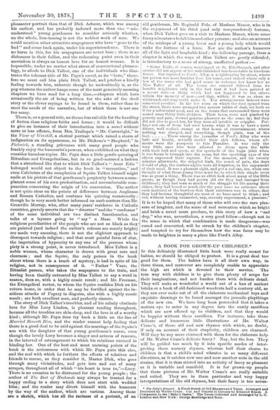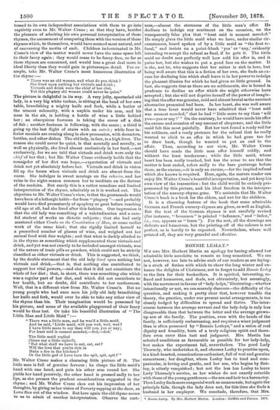A BOOK FOR GROWN-UP CHILDREN.*
IF this delicately illustrated little book were really meant for babies, we should be obliged to protest. It is a great deal too good for them. The babies have it all their own way, in these times, and moreover are completely unable to appreciate the high art which is devoted to their service. The true way with children is to give them plenty of scope for their imaginations, and not burden them with delicate detail. They will make as wonderful a world out of a box of ancient bricks or a book of old-fashioned woodcuts half a century old, as they can ever make out of all the elaborate mechanical toys and exquisite drawings to be found amongst the juvenile playthings of the new era. We have long been persuaded that it takes a mature eye to enter in any degree into the costly sacrifices which are now offered up to children, and that they would be happier without these sacrifices. For instance, take these delicate and humorous little illustrations of Mr. Walter Crane's, of those old and new rhymes with which, no doubt, if only on account of their simplicity, children are charmed. Will they be any more charmed with them for the elaborate help of Mr. Walter Crane's delicate fancy ? Nay, but the less. They will be guided too much by it into specific modes of inter- preting these nursery rhymes, whereas half their charm to children is that a child's mind vibrates in so many different directions, as it catches now one and now another note in the old strains, that it is thus stirred into an activity of fancy as pleasant as it is variable and manifold. It is for grown-up people that these pictures of Mr. Walter Crane's are really suitable and suited. They see in them particular and very happy interpretations of the old rhymes, but their fancy is too accus- • The Babe's Bouquet. A Fresh Bunch of Old Rhymes and Tunes. Arranged and Decorated by Walter Crane. Cut and Printed to Colours by Edmund Evan*. A Companion to the " Baby's Opera." The Tunes Collected and Arranged by L. C. London and New York : George Hontledge and Sone.
toured to its own independent associations with them to go into captivity even to Mr. Walter Crane ; so that they have, besides
the pleasure of admiring his own personal interpretation of these rhymes, the amusement of comparing them with the version of those rhymes which, to themselves, would have seemed most natural, and of canvassing the merits of each. Children indoctrinated in Mr. Crane's view of the matter would never have the same space left to their fancy again ; they would cease to be fancy-free, so far as these rhymes are concerned, and would lose a great deal more in ideal liberty than they would gain in picturesque detail. For ex-
ample, take Mr. Walter Crane's most humorous illustration of the rhyme :—
There was an old woman, and what do you think ? She lived upon nothing but victuals and drink ; Victuals and drink were the chief of her diet, Yet this plagney old woman could never be quiet."
The picture is delightful in its way. A very jolly, spectacled old lady, in a very big white turban, is sitting at the head of her own table, brandishing a mighty knife and fork, while a butler of the utmost solemnity, with a napkin under his arm, and his nose in the air, is holding a bottle of wine a little behind her ; an obsequious footman is taking the cover off a dish of fish ; another footman is following, with the sauce ; a third is going up the last flight of stairs with an entree; while four in- ferior menials are coming along in slow procession, with decanters, bottles, and other dishes. The old lady, in fact, is a high liver. The reason she could never be quiet, is that mentally and morally, as well as physically, she lived almost exclusively in her food,—not exclusively, for we are told that victuals and drink were only the chief of her diet ; but Mr. Walter Crane evidently holds that the remajpder of her diet was hope,—expectation of victuals and drink not yet absolutely before her. Victuals and drink in vision fill up the hours when victuals and drink are absent from the room. She indulges in sweet musings on the relevies, and her reins in the night-season summon her to meditate on the flavour of the madeira. But surely this is a rather mundane and limited interpretation of the rhyme, admirably as it is worked out. The objection to Mr. Walter Crane's view, is that the gourmande would have been of a lethargic habit—far from " plaguey "—and probably would have died prematurely of apoplexy or gout before reaching -old age at all, had she lived after this fashion. Our impression is that the old lady was something of a valetudinarian and a care- ful student of works on dietetic subjects ; that she had early mastered either Combe on the Constitution of Man, or some earlier
work of the same kind ; that she rigidly limited herself to .a prescribed number of glasses of wine, and weighed out her
animal food with fine weights ; and that what is darkly alluded to in the rhyme as something which supplemented these victuals and drink, and yet was not exactly to be included amongst victuals, was of the nature of tonic pills or powders, which could not be strictly classified as either victuals or drink. This is suggested, we think, by the double statement that the old lady lived upon nothing but -victuals and drink,--that is, that nothing else contributed to support her vital powers,—and also that it did not constitute the whole of her diet ; that, in short, there was something else which was a regular part of her diet, and which did not contribute to
her health, but no doubt, did contribute to her restlessness. Well, that is a different view from Mr. Walter Crane's. But no young people who had once seen his jolly old lady brandishing her knife and fork, would ever be able to take any other view of the rhyme than his. Their imagination would be possessed by his picture, and some of the available playground of their fancy would be thus lost. Or take his beautiful illustration of " The Little Man and Little Maid " :—
" There was a little man, and be woo'd a little maid. And he said, ' Little maid, will you wed, wed, wed ? I have little more to say than will you, yea or nay; For least said is soonest mended,—ded,—ded.'
The little maid replied (Some say a little sighed), But what shall we have to eat, eat, eat?
Will the love that you're rich in Make a fire in the kitchen?
Or the little god of Love turn the spit, spit, spit?'"
Mr. Walter Crane makes a charming little picture of it. The little man is full of genuine fervour ; he clasps the little maid's hand with one hand, and puts his other arm round her. She yields her hand pensively, the other hand is pressed sadly to her lips, as she presses the prudent considerations suggested in the
rhyme ; and Mr. Walter Crane ekes out his impression of her thoughts, by giving us her vision of Poverty rapping at the door, as Love flies out of the window. But here again the old rhyme seems to us to admit of another interpretation. Observe the curt-
ness,—almost the sternness of the little man's offer. He declines to indulge any sentiment on the occasion, on the transparently false plea that "least said is soonest mended." He simply gives the little maid what we have, under similar cir- cumstances, heard spoken of by a little maid as "the first re- fusal," and insists on a point-blank ' yea' or ' nay,' evidently intending to accept the refusal as final, if he gets it. The little maid no doubt sees perfectly well how cold his offer is, and it pains her, but she wishes to put a good face on the matter. It is she, not he, who suggests that her suitor is rich in love, but being well aware that this is a fiction of her own, she finds an ex- cuse for declining him which shall leave it in her power to indulge the pleasant illusion for which he had given so little ground. In fact, she suggests that as there are no settlements, she is bound in prudence to decline an offer which she might otherwise have accepted ; but she will not deprive herself of the power of imagin- ing that the offer was genuine, cold and almost brutal as the succinct alternative presented had been. In her heart, she was well aware that a true lover would never have admitted that "least said was soonest mended," that he had " little more to say than ' will you—yea or nay ?' " On the contrary, he would have made his offer the excuse and occasion of any amount of eloquence, and the little maid felt this most painfully. But her tact found a ready veil for his coldness, and a ready pretence for the refusal that he really wanted to elicit to an offer in which he had gone too far to draw back, though he wanted to put an end to the affair. Thus, according to our view, Mr. Walter Crane should have made the little man offer himself coldly, and without the least tenderness ; while the little maid, whose heart has been really touched, but has the sense to see that the matter is best ended, refers sadly to the bare pasturage before them, as the excuse,—it is only an excuse,—for the implied refusal which she knows is required. Here, again, the mature reader can enjoy Mr. Walter Crane's beautiful interpretation, and yet keep his own view of the transaction ; but the child would be entirely pre- possessed by this picture, and his ideal freedom in the interpre- tation of the nursery-rhyme gone. We maintain that Mr. Walter Crane's book is a book for the elders, and not for the children.
It is a charming feature of the book that some admirable German and French nursery-rhymes are given, as well as English. But the text of the German rhymes is not carefully revised (for instance, " besannen " is printed " befannen," and " liefen," i.e., ran, appears as " lusen "). For the rest, all the drawings are delicate and humorous, but the printing-off of the colours is not perfect, as is hardly to be expected. Nevertheless, where well printed off, they are very graceful and effective.



































 Previous page
Previous page